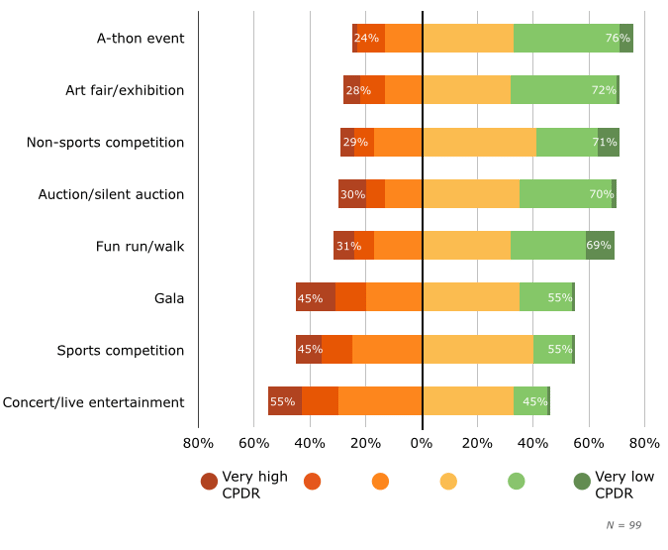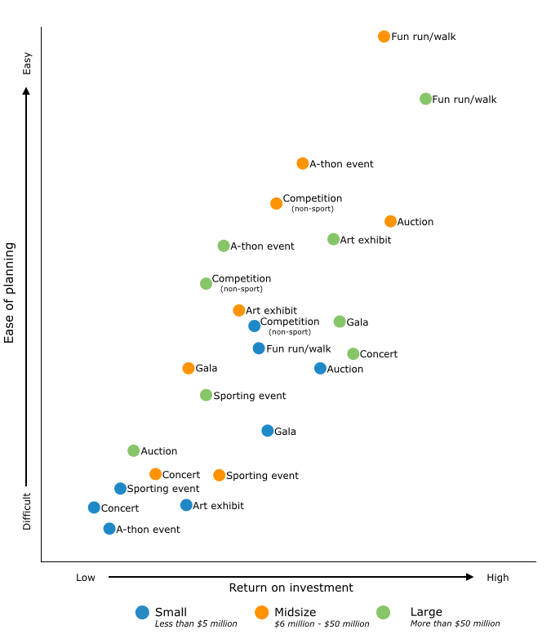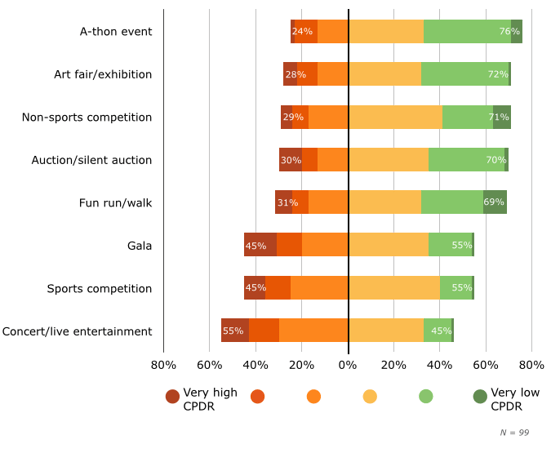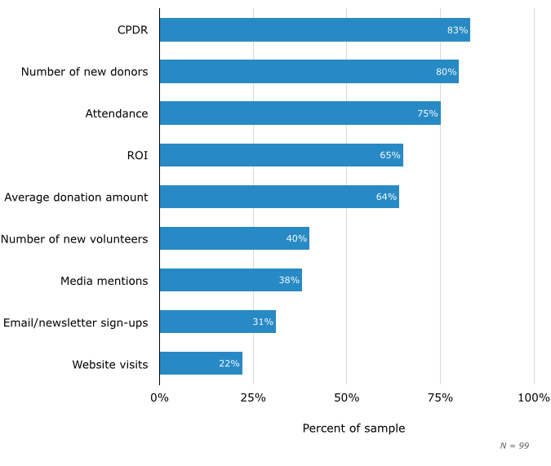

Related Posts
Subscribe to Our Blog
Subscribe to receive email notifications every time we publish new insights, news, and thought leadership to our blog.

Instead of “traditional” fundraising campaigns, some organizations like to spice things up by hosting unique events. But have you ever wondered which events require the least amount of preparation and deliver the best ROI?
Software Advice, a company that helps nonprofits shop for digital solutions, recently surveyed nonprofit event planners about their experiences with a variety of fundraising types: a-thon events, art fairs/exhibitions, non-sports competitions, auctions/silent auctions, galas, sports competitions, and concert/live entertainment.
In this post, we’ll offer our take on the survey’s findings and share tips for implementing effective fundraising events.
When planning an event, it’s important to take into account the size of your nonprofit. Regardless of organization size, however, the event planners surveyed agree that fun runs and walks can deliver excellent return on investment. (Keep in mind that these events assume the use of a high school track or community trail and do not include marathons and 5Ks.)
Midsized and large organizations with yearly operating budgets of $6 million or higher reap the most reward from fun runs and walks. Smaller organizations report having more difficulty with implementation, but they are still a good pick for nonprofits of all sizes.

What about getting the best “bang for the buck?” Software Advice also asked survey participants about the average cost per dollar raised (CPDR) for each event category. The data shows that a-thon events (such as walk-a-thons and bowl-a-thons) require the least outlay of cash. This makes them ideal for fundraising initiatives on a shoestring budget.
At the other end of the spectrum, concerts and other live entertainment events incur a higher CDPR. These are usually hosted by organizations with larger budgets and wider audience appeal.

Regardless of the organization’s size or budget, there are some universal considerations to think about when planning an effective fundraising event. These include:
Education: Take advantage of a captive audience at your event. As Certified Fundraising Executive Katherine Wertheim points out, “Events are usually transactional rather than transformational – meaning they focus on entertainment to secure a one-time donation, instead of education, which turns guests into long-term supporters.” Take the time when planning a fundraiser to strategize how you will work in information about your organization. “By the end of the event, guests should be able to tell you about the nonprofit, your cause, and why they should care about it. If they can’t do that, you’ve missed out.”
Ongoing donations: A misstep some nonprofits make is focusing on a single donation from supporters at events. Instead, think long-term. A fundraising event is a perfect time to ask for yearly pledges. As an example, Wertheim points to an organization that raised an impressive $130,000 on the day of its fundraiser. However, the organization took the time to demonstrate the importance of its impact and asked for pledges over the following five years. This practice led to a total of $470,000 over that period.
Technology: Work smarter, not harder. Whether you are organizing volunteers for the event, tracking donations and pledges, or needing a way to manage bids and payments for an auction, think about automation. Not only will technology make less work for your staff, but it will likely increase ROI as well. Learn more about automating your volunteer and donor management processes.
Evaluation: It’s important to have an objective means of measuring an event’s impact and effectiveness. Consultant Kathryn Hall recommends that organizations track expenditures, dollars raised, and the number of attendees for an event. Survey respondents’ top metrics included CDPR (cost per dollar raised), number of new donors, attendance, and ROI (return on investment). The full list from respondents includes:

Although there is often a higher investment of time and money, fundraising events are much more dynamic than your typical donor campaign. Just be mindful of your budget and return on investment, and you’re well on your way to successful – and effective fundraising events.
Subscribe to receive email notifications every time we publish new insights, news, and thought leadership to our blog.